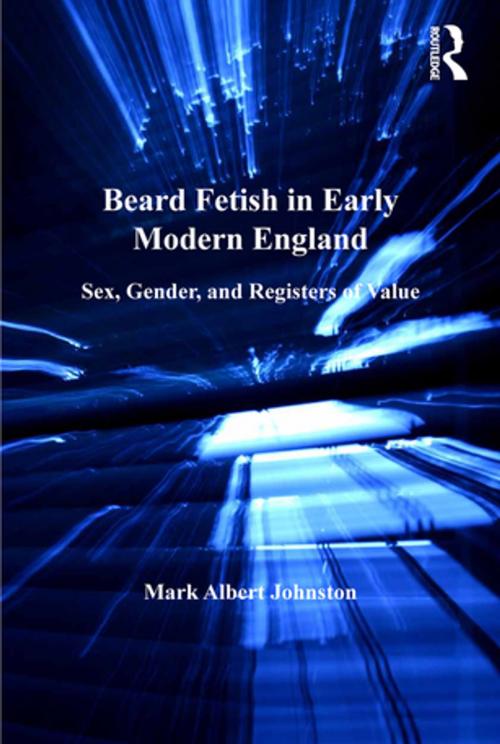Beard Fetish in Early Modern England
Sex, Gender, and Registers of Value
Nonfiction, Social & Cultural Studies, Social Science, Gender Studies| Author: | Mark Albert Johnston | ISBN: | 9781317175926 |
| Publisher: | Taylor and Francis | Publication: | April 15, 2016 |
| Imprint: | Routledge | Language: | English |
| Author: | Mark Albert Johnston |
| ISBN: | 9781317175926 |
| Publisher: | Taylor and Francis |
| Publication: | April 15, 2016 |
| Imprint: | Routledge |
| Language: | English |
Focusing on representations of beards in English Renaissance culture, this study elucidates how fetish objects validate ideological systems of power by materializing complex value in multiple registers. Providing detailed discussions of not only bearded men but also beardless boys, bearded women, and half-bearded hermaphrodites, author Mark Albert Johnston argues that attending closely to early modern English culture's treatment of the beard as a fetish object ultimately exposes the contingency of categories like sex, gender, age, race, and sexuality. Johnston mines a diverse cross-section of contemporary discourses -- adult and children’s drama, narrative verse and prose, popular ballads, epigrams and proverbs, historical accounts, pamphlet literature, diaries, letters, wills, court records and legal documents, medical and surgical manuals, lectures, sermons, almanacs, and calendars -- in order to provide proof for his cultural claims. Johnston’s evidence invokes some of the period’s most famous voices -- William Shakespeare, Ben Jonson, John Lyly, Phillip Stubbes, John Marston, George Chapman, Thomas Dekker, Thomas Middleton, and Samuel Pepys, for example -- but Johnston also introduces us to an array of lesser-known Renaissance authors and playwrights whose works support the notion that the beard was a palimpsestic site of contested meaning at which complex and contradictory values clash and converge. Johnston’s reading of Marxist, Freudian, and anthropological theories of the fetish phenomenon acknowledges their divergent emphases -- erotic, economic, racial and religious -- while suggesting that the imbrication of diverse registers that fetish accomplishes facilitates its cultural and psychic naturalizing function.
Focusing on representations of beards in English Renaissance culture, this study elucidates how fetish objects validate ideological systems of power by materializing complex value in multiple registers. Providing detailed discussions of not only bearded men but also beardless boys, bearded women, and half-bearded hermaphrodites, author Mark Albert Johnston argues that attending closely to early modern English culture's treatment of the beard as a fetish object ultimately exposes the contingency of categories like sex, gender, age, race, and sexuality. Johnston mines a diverse cross-section of contemporary discourses -- adult and children’s drama, narrative verse and prose, popular ballads, epigrams and proverbs, historical accounts, pamphlet literature, diaries, letters, wills, court records and legal documents, medical and surgical manuals, lectures, sermons, almanacs, and calendars -- in order to provide proof for his cultural claims. Johnston’s evidence invokes some of the period’s most famous voices -- William Shakespeare, Ben Jonson, John Lyly, Phillip Stubbes, John Marston, George Chapman, Thomas Dekker, Thomas Middleton, and Samuel Pepys, for example -- but Johnston also introduces us to an array of lesser-known Renaissance authors and playwrights whose works support the notion that the beard was a palimpsestic site of contested meaning at which complex and contradictory values clash and converge. Johnston’s reading of Marxist, Freudian, and anthropological theories of the fetish phenomenon acknowledges their divergent emphases -- erotic, economic, racial and religious -- while suggesting that the imbrication of diverse registers that fetish accomplishes facilitates its cultural and psychic naturalizing function.















